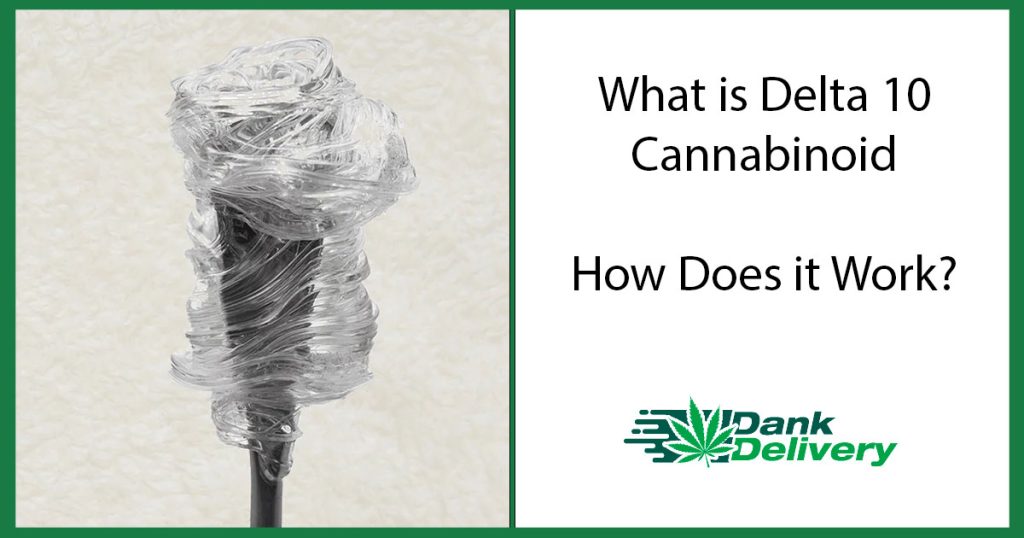| Outline |
|---|
| I. Introduction |
| II. A brief history of cannabinoids |
| A. THC and CBD |
| B. The discovery of Delta 10 |
| III. What is Delta 10 THC? |
| A. Chemical structure |
| B. Comparing Delta 10 to Delta 8 and Delta 9 THC |
| IV. How does Delta 10 work? |
| A. Interaction with the endocannabinoid system |
| B. Binding to cannabinoid receptors |
| V. Delta 10 effects and benefits |
| A. Potential therapeutic applications |
| B. Recreational use |
| VI. Delta 10 safety and legality |
| A. Legality across the United States |
| B. Potential side effects |
| VII. How to use Delta 10 |
| A. Different forms and products |
| B. Dosage recommendations |
| VIII. Conclusion |
| IX. FAQs |
What Is Delta 10 Cannabinoid And How Does It Work?
I. Introduction
The world of cannabinoids has expanded rapidly in recent years, with new compounds gaining attention for their unique properties and potential health benefits. One such compound is Delta 10 THC, a lesser-known relative of the more famous Delta 9 THC and Delta 8 THC. In this article, we’ll explore what Delta 10 is, how it works, its effects, and more.
II. A brief history of cannabinoids
A. THC and CBD
Cannabinoids are naturally occurring compounds found in the cannabis plant. Delta 9 THC and CBD are the most well-known cannabinoids due to their psychoactive and medicinal properties, respectively. Over the years, research has led to the discovery of more than 100 other cannabinoids, each with unique characteristics.
B. The discovery of Delta 10
Delta 10 THC was discovered accidentally during a process to extract other cannabinoids. Its unique structure and properties have since garnered interest from researchers and consumers alike.
III. What is Delta 10 THC?
A. Chemical structure
Delta 10 is a minor cannabinoid, meaning it’s found in much lower concentrations than its more popular counterparts. Its chemical structure is similar to Delta 9 and Delta 8 THC, with a double bond located at a different position in the carbon chain.
B. Comparing Delta 10 to Delta 8 and Delta 9 THC
Delta 10 is less potent than Delta 9 THC, resulting in milder psychoactive effects. Like Delta 8, Delta 10 is thought to have a more manageable high, which may appeal to those seeking therapeutic benefits without intense psychoactivity.
IV. How does Delta 10 work?
A. Interaction with the endocannabinoid system
Delta 10, like other cannabinoids, interacts with the body’s endocannabinoid system (ECS). The ECS plays a crucial role in maintaining homeostasis and regulating various functions, such as mood, appetite, and sleep.
B. Binding to cannabinoid receptors
Delta 10 binds to both CB1 and CB2 receptors, which are found throughout the body. CB1 receptors are primarily located in the brain and nervous system, while CB2 receptors are more abundant in the immune system and peripheral organs. This binding influences the ECS, leading to Delta 10’s effects.
V. Delta 10 effects and benefits
Potential therapeutic applications
Research on Delta 10 is still in its early stages, but preliminary findings suggest potential therapeutic benefits. Some of these may include:
- Anxiety relief: Delta 10 could help alleviate anxiety, similar to how Delta 8 has been shown to do.
- Pain relief: Some studies suggest that Delta 10 may have analgesic properties, making it potentially helpful for managing pain.
- Anti-inflammatory effects: Delta 10 may possess anti-inflammatory properties, which could benefit those with inflammatory conditions.
It’s important to note that more research is needed to fully understand Delta 10’s therapeutic potential.
B. Recreational use
Delta 10’s mild psychoactive effects may appeal to recreational users who seek a more manageable high compared to Delta 9 THC. Users often report feeling a sense of mental clarity and focus, with a more subtle euphoria than that associated with Delta 9.
VI. Delta 10 safety and legality in Canada
A. Legality in Canada
In Canada, the Cannabis Act regulates the production, distribution, and sale of cannabis products. Delta 10 THC, as a derivative of the cannabis plant, falls under this legislation. To purchase Delta 10 products in Canada, you’ll need to ensure they are sourced from licensed producers and follow federal and provincial regulations.
B. Potential side effects
Delta 10’s side effects are thought to be mild, particularly when compared to Delta 9 THC. Some users may experience dizziness, dry mouth, or mild anxiety. As with any cannabinoid, it’s essential to start with a low dose and gradually increase until you find your optimal level.
VII. How to use Delta 10 in Canada
A. Different forms and products
Delta 10 THC is available in various forms, including:
- Tinctures
- Edibles
- Vape cartridges
- Distillates
- Topicals
When choosing a Delta 10 product, consider factors such as desired effects, ease of use, and personal preference.
B. Dosage recommendations
Dosage for Delta 10 can vary depending on individual factors like body weight, metabolism, and desired effects. It’s generally recommended to start with a small dose (such as 5-10mg) and gradually increase as needed. Always follow product guidelines and consult a healthcare professional if you’re unsure about proper dosage.
VIII. Conclusion
Delta 10 THC is a promising minor cannabinoid with potential therapeutic and recreational benefits. Though research is limited, early findings suggest it could offer a milder psychoactive experience than Delta 9 THC, appealing to those who desire a more manageable high. As with any cannabinoid, be sure to familiarize yourself with the legal regulations in Canada and consult a healthcare professional for advice on proper usage.
IX. FAQs
1. Is Delta 10 THC legal in Canada?
Yes, Delta 10 THC falls under the Cannabis Act in Canada. Ensure you source products from licensed producers and follow federal and provincial regulations.
2. What are the effects of Delta 10 THC?
Delta 10 THC is known for its mild psychoactive effects, including mental clarity, focus, and subtle euphoria. It may also have potential therapeutic benefits, such as anxiety relief, pain relief, and anti-inflammatory properties.
3. How does Delta 10 THC differ from Delta 9 THC?
Delta 10 THC has a similar chemical structure to Delta 9 THC, but with a double bond in a different position on the carbon chain. This results in milder psychoactive effects compared to Delta 9 THC.
4. What forms of Delta 10 THC are available in Canada?
Delta 10 THC is available in various forms, including tinctures, edibles, vape cartridges, distillates, and topicals.
5. How should I dose Delta 10 THC?
Start with a low dose (5-10mg) and gradually increase as needed. Factors like body weight, metabolism, and desired effects can influence the ideal dosage. Consult a healthcare professional for personalized advice.



